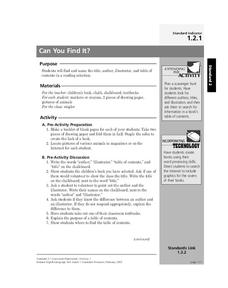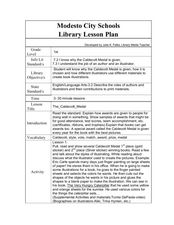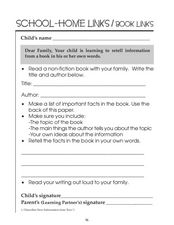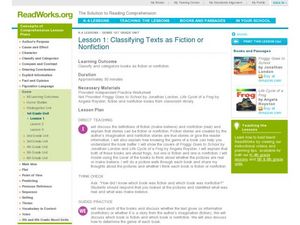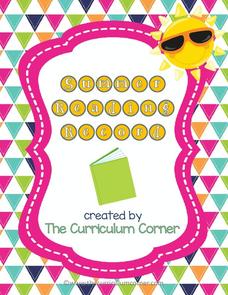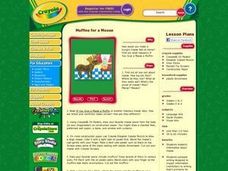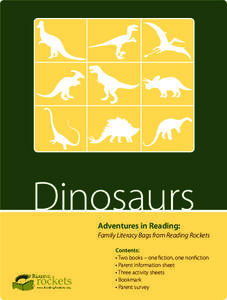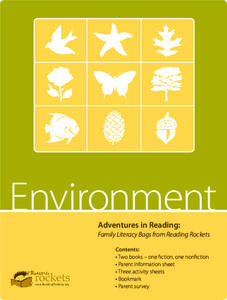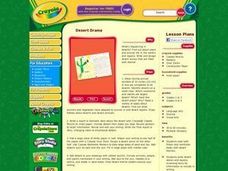Curated OER
Can You Find It?
Plan a Parts of a Book scavenger hunt. Begin by giving your young adventurers a book, and asking them to find the title, author, illustrator, and table of contents. After a discussion of the purpose of each of these items, class members...
Curated OER
Authors and Illustrators: What do they do?
Help readers understand the roles of authors and illustrators and why they have been recognized by medals of excellence. Your class will discuss and then create illustrations for a book. When they have finished, you can hold your own...
Curated OER
Introduce Vocabulary: Clouds (Bauer)
What type of cloud is that? Explore meteorological vocabulary using Marion Bauer's book, Clouds (although these strategies could be used for any fiction or nonfiction text). Pre-teach the new words before reading the story aloud....
Curated OER
Natural Disasters: An Adventure in Non-Fiction
Learners study different natural disasters. In this natural disaster lesson students read a nonfiction book followed by a discussion, an experiment, then collect illustrations from their experience.
Pennsylvania Department of Education
Comparing Key Ideas and Details in Fiction and Nonfiction
Learners recognize the differences between fiction and nonfiction texts. In this genre study lesson, students discuss what nonfiction means and write the definition. Learners listen to a read aloud and vote whether the text is fiction or...
Curated OER
Very Good Facts About Very Good Books
Students identify the characteristics of fiction and non-fiction texts. For this genre study lesson, students read the books A Butterfly Alphabet Book and I Wish I Were a Butterfly. Students develop a graphic organizer to compare and...
Curriculum Corner
I See a School
Enthusiastic readers report on a book detailing what it's about and their favorite part with a picture-based writing template. A nonfiction version takes a step further to highlight what the pupil learned, and a fiction version showcases...
Roseburg Public Schools
Library Skills and Literature
The library is such a valuable resource for kids of all ages. Help elementary readers learn all about parts of the library, text features for both fiction and nonfiction text, and different ways to find books that they want to read.
Curated OER
School-Home Links/Book Links: Non-Fiction
For this early childhood non-fiction comprehension worksheet, students read a non-fiction book with caregiver, list the important facts, and retell the book in their own words.
Curated OER
Lesson 1: Classifying Texts as Fiction or Nonfiction
First graders characterize fiction and non-fiction books, they discover the characteristics of each type of book and compare two books (one fiction & one nonfiction) about the same subject. They make a list that describes what makes...
Curated OER
Build Mastery: Making Inferences
Do your youngsters realize that they are constantly making inferences? Expose this inner process by bringing out the book they will be reading. Ask scholars what they think the plan is, and explain that their answers are the product of...
PBS
Reading Adventure Pack: Oceans
Flotsam by David Wiesner and The Magic School Bus on the Ocean Floor by Joanna Cole, illustrated by Bruce Degen, begin a reading adventure pack focusing on oceans. With story listening and thoughtful discussion, scholars complete several...
Curriculum Corner
Summer Reading Record
No more summer reading lag! Give young readers a set of graphic organizers and worksheets to keep track of the books they read over the summer and to keep reading comprehension skills fresh. The graphic organizers include identifying...
Curated OER
Guided Reading: Three Little Pigs (Plus Wolf: Javalinas)
Guide your class through reading various versions of The Three Little Pigs. Talk about the traditional story line and then discuss a different point of view: Maybe the wolf was just an innocent bystander! This lesson plan, which has...
Curated OER
Muffins for a Moose
Young scholars research all the information they can about moose. After reading a book about the animal, they compare and contrast nonfiction and fiction books. To end the lesson, they use Crayola markets to draw their favorite scene...
Curated OER
Library Lesson Plan
Explain the differences between fiction and non-fiction and the characteristics of a biography. Learners analyze three pieces of literature on the same topic to determine which is fiction and which is non-fiction. In the end, relate the...
PBS
Reading Adventure Pack: Cooking
A Reading Adventure Pack focuses on cooking. Scholars participate in three hands-on activities after reading the fiction book Easy as Pie by Cari Best and the nonfiction book How Did That Get in My Lunchbox? by Chris Butterworth....
PBS
Reading Adventure Pack: Dinosaurs
Two books—Dinosaurs by Gail Gibbons and Danny and the Dinosaur by Syd Hof—begin a learning experience in which scholars complete three creative, imaginative, and real-world activities. First, pupils create a puzzle featuring their...
Curated OER
Differences Between Fiction And Non-Fiction in the Library
Young scholars examine the differences between fiction and non-fiction books in the library by discussing kangaroos. They distinguish between facts about kangaroos, and using their imaginations and imagining what they would do with pet...
Curated OER
We Like to Imagine - Animals
Students describe a pretend animal. They read "The After School Monster." Students read other books and discuss whether or not the characters are real. Students make a drawing of a pretend animal and of a real animal. They make up a...
Curated OER
Researching Using Books
Young scholars investigate researching techniques by exploring their library. In this literature references lesson, students identify the different types and genres of books that are readily available at their local library as well as...
PBS
Reading Adventure Pack: Environment
A fiction and nonfiction text, The Great Kapok Tree: A Tale of the Amazon Rain Forest by Lynne Cherry and I See a Kookaburra! Discovering Animal Habitats Around the World by Steve Jenkins and Robin Page begins a learning experience in...
Curated OER
The Seeds We Need
Learners apply word analysis skills to recognize new words, identify genres of fiction and nonfiction, and identify important themes and topics. They explore differences in plants, flowers, and vegetables. A book bag full of activities...
Curated OER
Desert Drama
Students read both fiction and nonfiction books with desert themes. Then they write desert stories and reports, reviewing texts for information to include in writing. Students also design desert scenes with details and setting elements...


